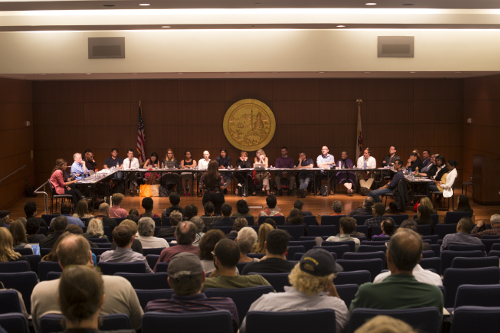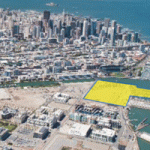Proposition E would give members of the public more access to, and control over, the meetings of San Francisco government’s “policy bodies,” which direct City Hall’s political agendas.
Why is this on the ballot? 
San Francisco has more than 120 “policy bodies” — committees, subcommittees, boards, councils and others. These groups are the visible component of local government, and members of the public can show up at their meetings, talk to city staff and make on-the-record comments. But because these meetings happen at a wide variety of times and places, it is inconvenient, if not impossible, for the public to attend. Some of those meetings are broadcast live over the Internet, others are not.
What would it do?
Proposition E would allow people to make comments for public meetings without attending in person. They would have two options:
- Send prerecorded video comments to City Hall at least two days before the meeting. If the comments were not in English, city staff would add English captions or dubbing.
- Send live video, audio or emailed comments during the meeting.
In addition, all public meetings would have to be streamed live. Members of the public, or of the meeting’s government body, could request that certain agenda items start and stop at specific times.
Is there a catch?
Proposition E would allow anyone to submit a video comment, including someone who lived in another state. That could heavily burden government workers and increase the length of meetings in general.
Only prerecorded video comments would definitely get translated into English. Live comments might get translated — if a translator happened to be present at that meeting.
Would it increase the cost of government?
Proposition E would carry an initial, one-time cost of $1.7 million to set up the video equipment for policy bodies that do not already have it. In addition, it would cost at least $750,000 per year to maintain that equipment and cover the cost of new staff, like technical support and translators, according to the city controller’s estimates.
Who officially proposed it?
David Lee, executive director of the Chinese American Voters Education Committee.
Who officially opposes it?
Smart Open Government SF, an organization created to oppose this measure.
Follow the money
View all filing activity supporting or opposing this measure.
Still puzzled?
We want your questions. If you’re still wondering about how Proposition E will work or impact San Francisco, ask! Use #election2015 and our Twitter handle (@sfpublicpress) and we will do our best to get answers.
Photos by Stella Sadikin / San Francisco Public Press








